Bài giảng Tiếng Anh Lớp 12 - Unit 1: Home life - Lesson: Reading
Activity 1: Skimming
Activity 2: PAIR WORK
Choose the sentence A, B or C that is nearest in meaning to the sentence given.
1. He doesn’t come home until very late at night.
A. He never comes home late at night.
B. He comes home late at night.
C. He sometimes comes home late at night.
A. Both men and women are good at building houses.
B. Men and women have to live separately.
C. Men’s responsibility is to work and support the family and women’s job is to look after the family.
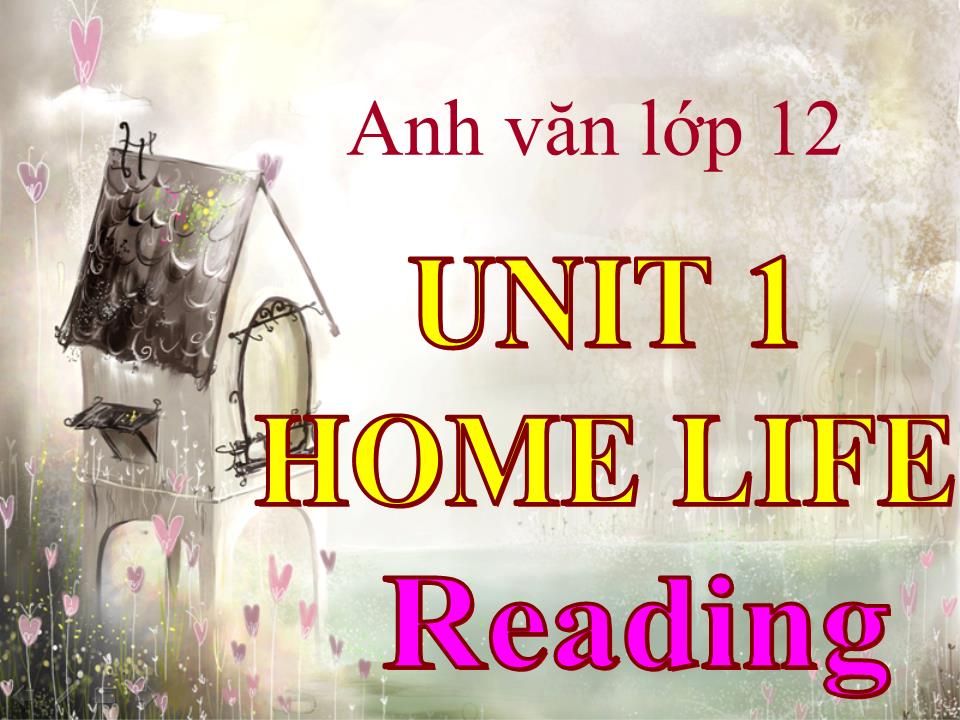
Trang 1

Trang 2
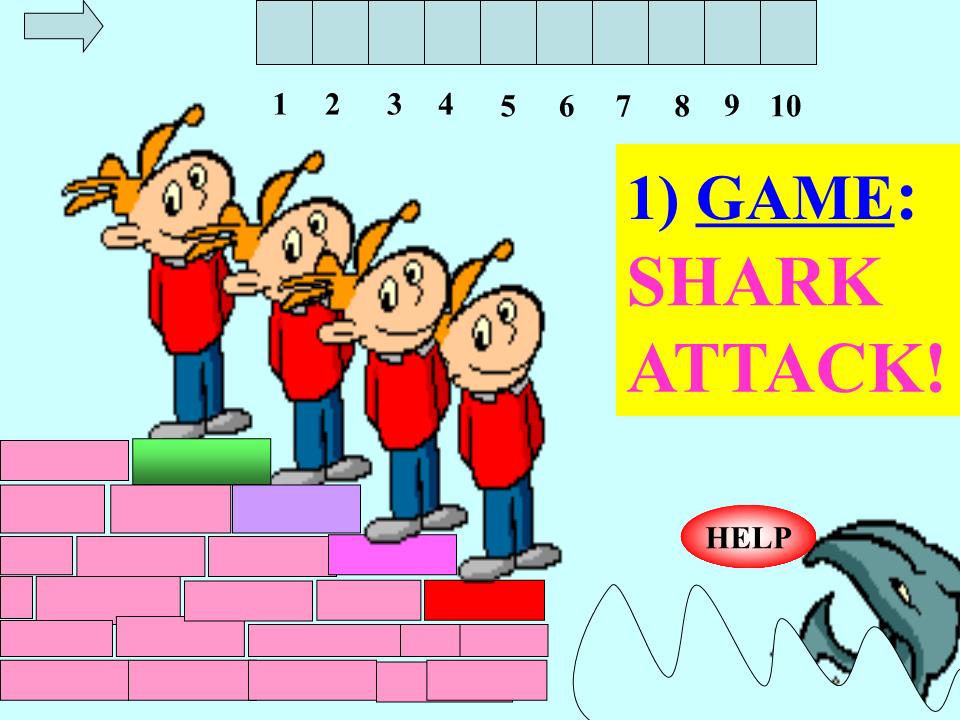
Trang 3
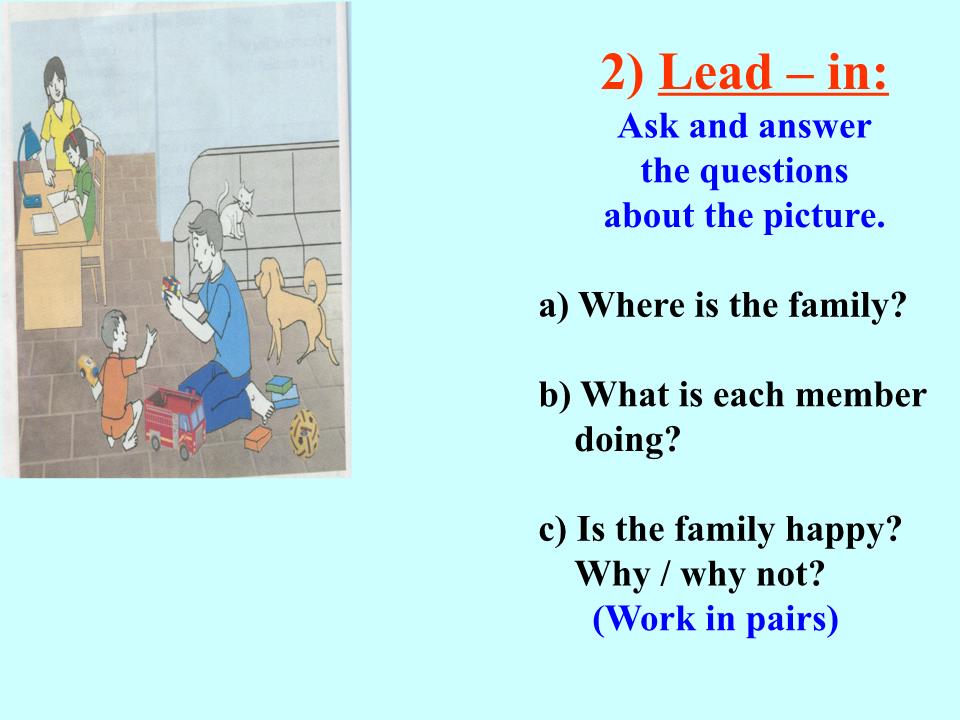
Trang 4
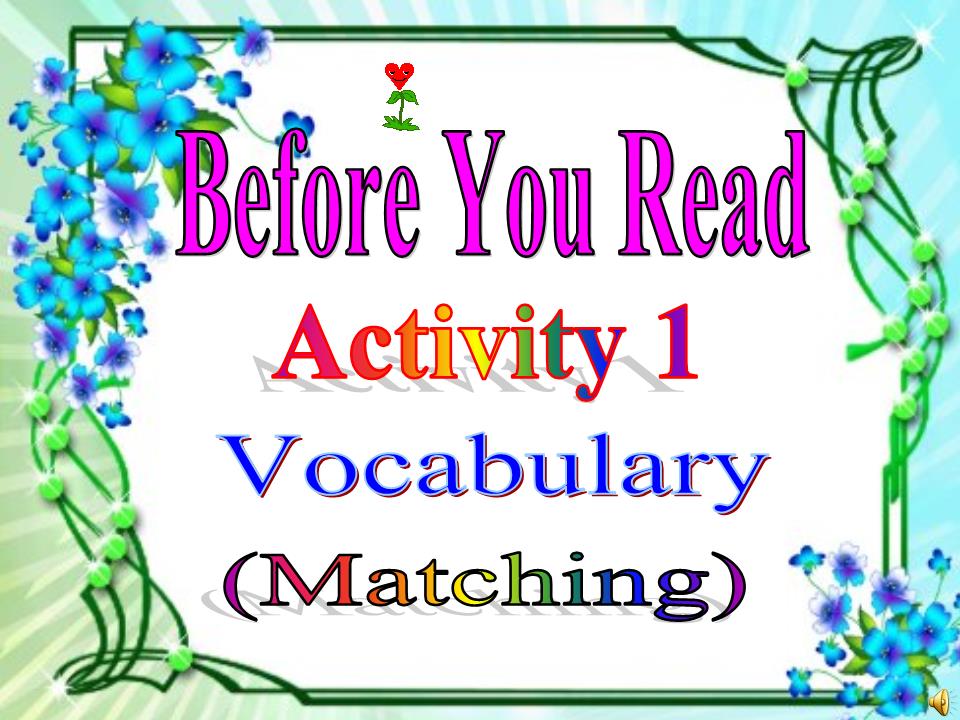
Trang 5
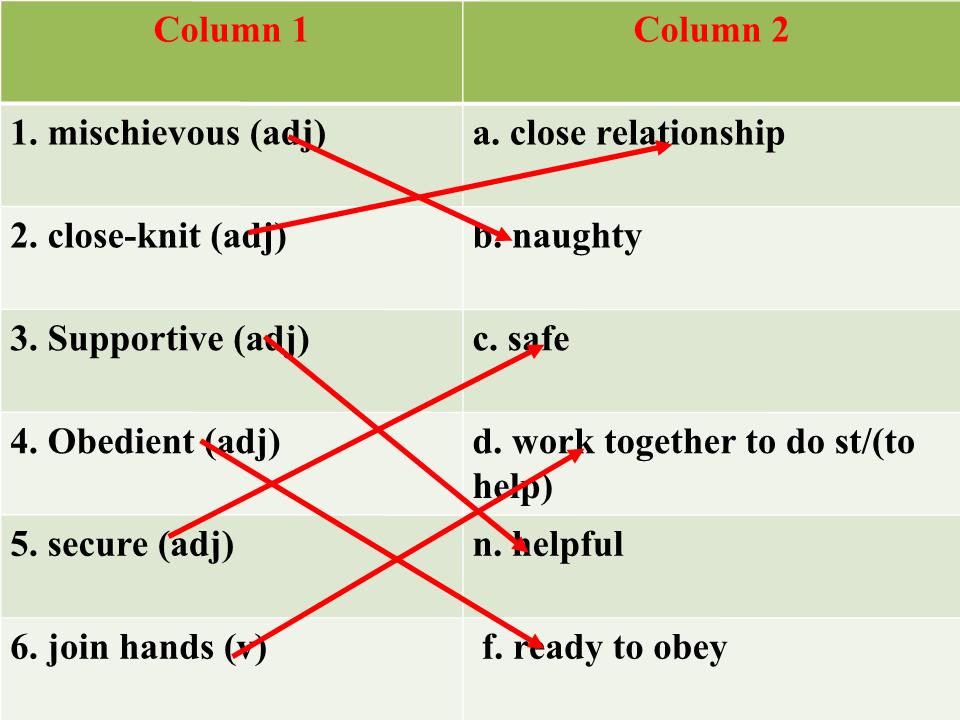
Trang 6
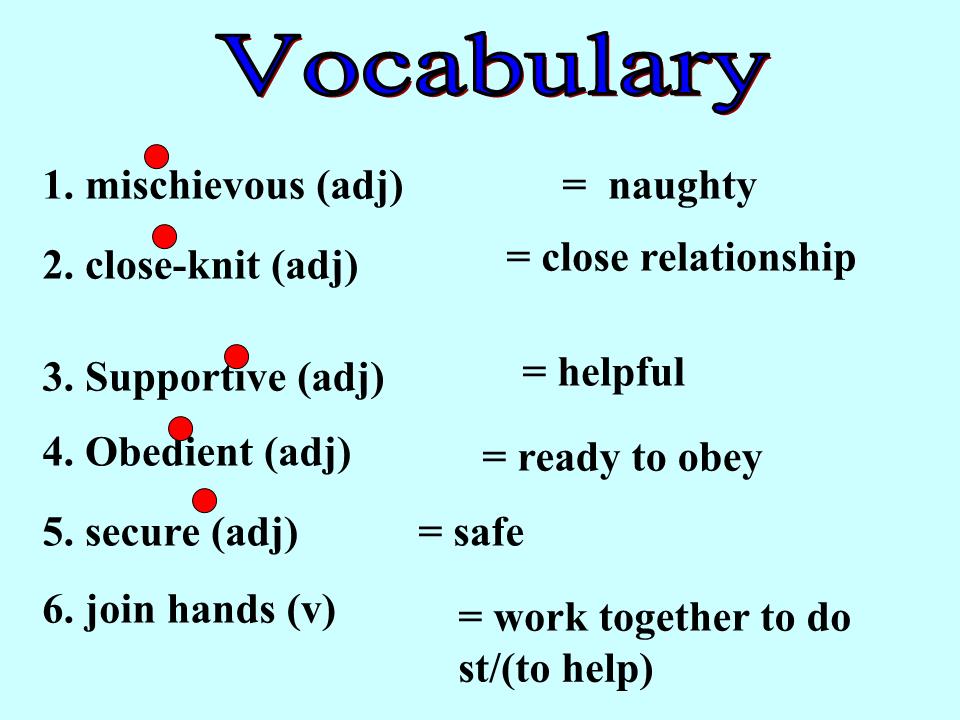
Trang 7
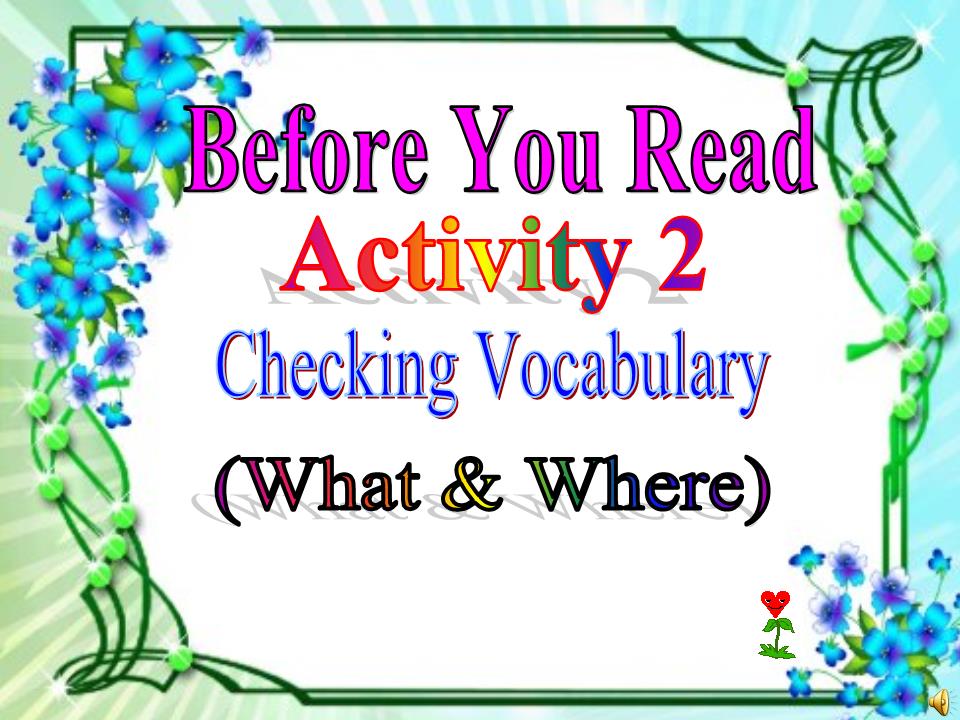
Trang 8

Trang 9
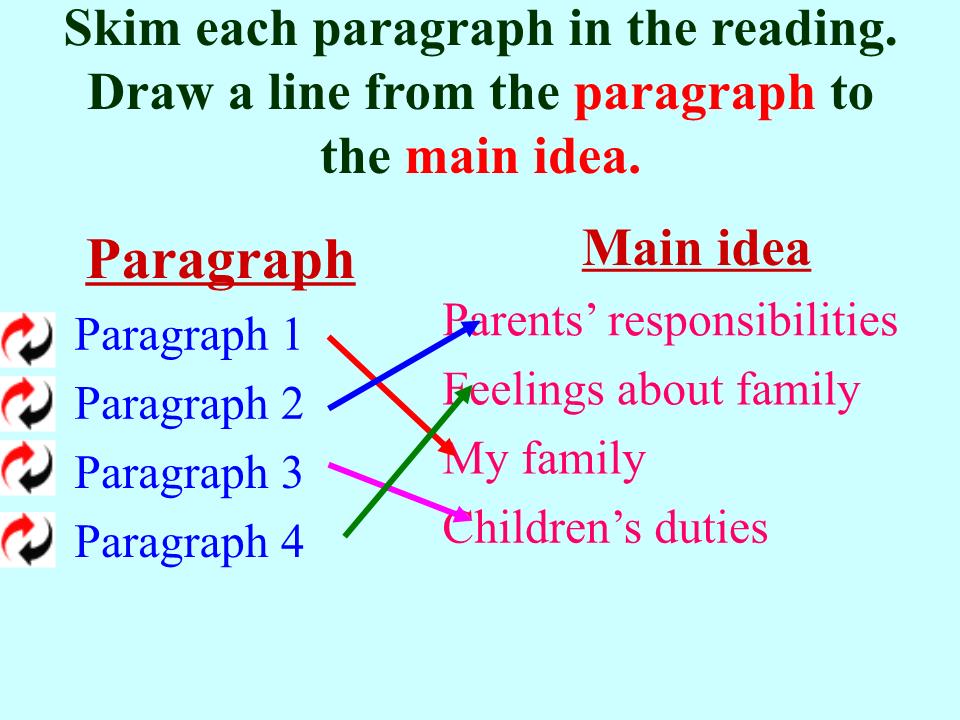
Trang 10
Tải về để xem bản đầy đủ
Bạn đang xem 10 trang mẫu của tài liệu "Bài giảng Tiếng Anh Lớp 12 - Unit 1: Home life - Lesson: Reading", để tải tài liệu gốc về máy hãy click vào nút Download ở trên
Tóm tắt nội dung tài liệu: Bài giảng Tiếng Anh Lớp 12 - Unit 1: Home life - Lesson: Reading
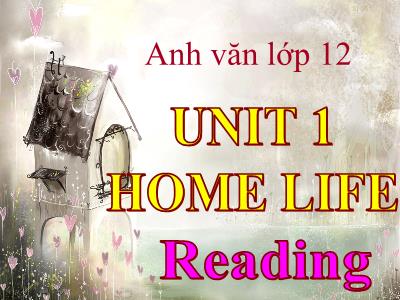
UNIT 1 HOME LIFE Reading Anh văn lớp 12 WARM - UP 1) Game: Shark Attack 2) Lead - in (Pairwork) 8 HELP F A M I L Y L I F E 1) GAME : SHARK ATTACK! 1 2 3 4 5 6 7 9 10 2) Lead – in: Ask and answer the questions about the picture. a) Where is the family? b) What is each member doing? c) Is the family happy? Why / why not? (Work in pairs) Before You Read Activity 1 Vocabulary (Matching) Column 1 Column 2 1. mischievous (adj) a. close relationship 2. close-knit (adj) b. naughty 3. Supportive (adj) c. safe 4. Obedient (adj) d. work together to do st/(to help) 5. secure (adj) n. helpful 6. join hands (v) f. ready to obey Vocabulary 1. mischievous (adj) = close relationship 2. close-knit (adj) = naughty 3. Supportive (adj) = helpful 4. Obedient (adj) = ready to obey 5. secure (adj) = safe 6. join hands (v) = work together to do st/(to help) Before You Read Activity 2 Checking Vocabulary (What & Where) Skimming While You Read Activity 1 (Pairwork) Skim each paragraph in the reading. Draw a line from the paragraph to the main idea. Paragraph Paragraph 1 Paragraph 2 Paragraph 3 Paragraph 4 Main idea Parents’ responsibilities Feelings about family My family Children’s duties Scanning the details While You Read Activity 2 (Pairwork) Activity 2: PAIR WORK Choose the sentence A, B or C that is nearest in meaning to the sentence given. 1. He doesn’t come home until very late at night. A. He never comes home late at night. B. He comes home late at night. C. He sometimes comes home late at night. 2. “Men build the house and women make it home” A. Both men and women are good at building houses. B. Men and women have to live separately. C. Men’s responsibility is to work and support the family and women’s job is to look after the family. 3. Our parents join hands to give us a nice house and a happy home. A. Our parents work together to give us a nice house and a happy home. B. Our parents take each other’s hands when they give us a nice house and a happy home. C. Our parents shake hands when they give us a nice house and a happy home. 4. The boys are mischievous sometimes. A. The boys are well-behaved sometimes. B. The boys enjoy playing tricks and annoying people sometimes. C. The boys miss their parents sometimes. 5. We are very close-knit family. A. Members of our family have very close relationships with each other. B. Members of our family need each other. C. Members of our family are never close to each other. Questions - Answers While You Read Activity 3 Activity 3 : Answer the questions. How busy are the parents in the passage? Very busy. They have to work long hours and sometimes they have to work at night. How caring is the mother? She is always the first one to get up in the morning to make sure that her children leave home for school with breakfast and in suitable clothes. She always makes dinner ready before her husband comes home. How do the father and the daughter share the household chores? The daughter helps with household chores: she washes the dishes and takes out the garbage. She also looks after the boys. The father sometimes cooks or mends things around the house at weekends. What is the daughter attempting to do after secondary school? She is attempting to win a place at university. Why do the children feel they are safe and secure in their family? Because they are very close-knit and supportive of one another. They often share their feelings and whenever problems come up, they discuss them frankly and find solutions quickly. Discussion After You Read Activity (Pairwork) Work in pairs. Ask and questions about your partner’s family. 1) How many people are there in your family? 2) Does your father share the household chores? How? 3) Do you? How? 4) How caring is your mother? 5) Do you and your sister (brother) feel safe and secure in your family? Why? Discussion My family I come from a small family of five people including my parents, two younger brothers and I/me . My mother is a nurse and my father is a biologist . My parents go to work, but when they come home they join hands to do the household chores and teach all of us. We love our parents, too. We are very close-knit family. We always feel homesick whenever we go far. In fact, wherever you go, whatever you do, whoever you are; East or West; “home” is the best. There is no place like your “home”. Retelling Suggested HOMEWORK Learn by heart all the new words. Answer the questions ( Activity 3). Retell about your family. Prepare for the Speaking Lesson in advance. Thank you For joining us!
File đính kèm:
 bai_giang_tieng_anh_lop_12_unit_1_home_life_lesson_reading.ppt
bai_giang_tieng_anh_lop_12_unit_1_home_life_lesson_reading.ppt

